Daley Downing's Blog, page 26
May 20, 2018
The Great American Read: Part 1
[image error]
Recently I mentioned The Great American Read (TGAR), and how part of the Summer Reading Challenge my local library is hosting this year involves encouraging patrons to see how many of the list they can check off. When I downloaded the master list, I was pleased (and surprised) to find I’ve already read 35 of the selections. Some of the others I’ve heard of but not read, never heard of, have no intention of ever reading, or may attempt one day. But in the next few posts, we’re going to be focusing on the ones I have completed.
Books on the List I Have Read (as well as approximately in which year, and for school or by personal choice) :
The Adventures of Tom Sawyer by Mark Twain (1988?, personal)
This was one of the few classics I remember hanging around in my childhood that I actually read. Or had read to me. Honestly, I’m a little fuzzy on the details. I do know it was finished at least twice, because I recall enough of the plot and characters to confirm certain things which would’ve only come from more than a quick bedtime read. Anyway, I’m truly not sure why I wanted to pick this one, as a child who was much more into fantasy than historical fiction. I didn’t even realize how important Mark Twain was to the country at that point. And there was a lot about the dialect and time period I didn’t understand, so it was hard to follow stuff like why Tom Sawyer got his friends to paint the fence for him. (Since I was living in a town/era when painting a fence was an utterly alien concept, or the fact it was actually an arduous chore.) I did get that Tom had a massive crush on Becky Thatcher, and that people felt she deserved better than that silly boy (but again, I never grasped why the townspeople all thought that of him).
Alice’s Adventures in Wonderland by Lewis Carroll (1987?, personal)
This I volunteered to read, and happily re-read several times. I loved the characters (especially Alice, the Cheshire Cat, the Caterpillar, the March Hare, and Dinah). I’ve seen a few of the movie and TV adaptations, and enjoyed most of them. My favorite was the Syfy modern version; Alice and Hatter were adorable together.
The Book Thief by Markus Zusak (2010?, personal)
This title came recommended by one of my Early Childhood professors. She thought it was a unique storytelling style, about a very important topic (WW II), from the unusual POV of a German citizen during the time period. I agreed. It was a bit hard to get into the author’s rambling, at times nearly neurotransmitter-misfiring style, but I found the story very precious, and cried so much at the end.
Charlotte’s Web by EB White (1989?, school)
First introduced to me in third or fourth grade, I believe, via whichever teacher was insistent we students read it, carrying on the tradition, Charlotte’s Web is a title that changed for me as I grew up. At first, I was so taken with poor Wilbur’s plight, and Charlotte’s doting, motherly ways — but I think that’s how the author sucks innocent children in, to destroy their hearts later. Yes, I am aware livestock on farms become food all the time — and since I’m not a vegetarian, I’m part of that, and I accept it. This isn’t a novel I’d recommend for children anymore. I really feel there are other works that humanize animal motivations and feelings in an engaging and entertaining way without deviously pushing an agenda.
[image error]
The Chronicles of Narnia by CS Lewis (1990, 2007-08, personal)
I loved the old BBC movies of The Lion, the Witch and the Wardrobe as a kid, and really enjoyed the book the first time around. White Fang truly liked the whole series, but most of the books I just found dull and dragging. White Fang’s faves were Prince Caspian and Voyage of the Dawn Treader.
The Color Purple by Alice Walker (2005, school)
I liked this book a lot more than I expected to. I’d seen the movie, and wasn’t that impressed, and slightly terrified. I knew the story covered the harsh realities of domestic violence, and the high rate of abuse against women in the post-Civil-War black community. (If I remember correctly, it’s set in the early 20th century.) But the novel has layers upon layers of deep insight, into not just the abuse, but also what it may mean to be a woman, at different times in society and different cultures, how women can change their circumstances, or how circumstances may fight against them, and how sisterhood (not necessarily blood) can bring an abused woman out of darkness. It’s quite an interesting, controversial, and important tale.
The Curious Incident of the Dog in the Night-Time by Mark Haddon (2009, personal)
I cried and raged by page 30 of this novel. I was SO upset by the obvious ignorance and prejudice shown against the autistic narrator. I skimmed a big chunk of the middle, and was so distraught by the end I honestly don’t even remember what happened in the resolution. I don’t recommend this title as an autism rep read. Not at all. It’s just so sad and agonizing.
The Da Vinci Code by Dan Brown (2008?, personal)
I had to see what all the fuss was about. The novel itself is wordy, there are too many subplots, and I really prefer the movie version. If you do your research, you’ll find NONE of the conspiracy theory offered in the book is new; Dan Brown drew on old theories or legends that had been around for centuries. Is any of it true? Some of it, yes — for example, the Knights Templar were long believed to have found an artifact or relic from the Temple of Solomon that was considered lost to history, and that the Catholic Church at the time would have seen it as very threatening to their hold on world affairs. (Many Popes back in the Middle Ages were not nice fellows.) Is there absolute proof that Jesus of Nazareth was married to Mary Magdalene and they had children? Not a stitch. Does it make for an awesome story? Totally. Even as a Christian, I honestly thought the idea of there being living descendants of such an influential historical figure (not bringing religious beliefs or discussions into it at all), that may actually have the ability to, say, perform miracles in a modern, secular world, was quite beautiful. Just for the record, though, I don’t think the Priory of Scion really exists, or ever did.
[image error]
Dune by Frank Herbert (2004?, personal)
I was kind of forced. I never made it through the entire tome. I’ve seen the whole movie (which took about 3 days to watch, and approximately 3 years off my life). Sorry, any fans, but this is not for me at all.
Frankenstein by Mary Shelley (1995?, 2005?, school)
Yes, I’ve actually had to read this for English classes twice. I understood it more the second time around, but didn’t like it more. I feel SO bad for the “monster,” and Dr. Frankenstein needs to be sacrificed to medical science. Give me the Mel Brooks version any day.
Game of Thrones by George RR Martin (2017, personal)
I watched 3 or 4 episodes of the show and wanted to die. I could not stand the INTENSE profanity, violence, and explicit sexual content (especially the misogny). (And Boromir — ahem, Sean Bean — gets killed off in season 1! Is there no justice?!) But my social media feed kept picking up ravings (in a good way) about the series, so I checked book 1 out of the library. I was impressed. Martin is a true wordsmith in his early works — the story draws you in, setting and characters come alive, the danger feels too real, the emotions of Ned Stark and the Khaleesi Daenerys and Tyrion Lancaster are SO palpable. The last chapter literally brought me to tears. Martin’s world in text is compelling, perilous, and very unfair, but I understood the bloodshed and the mistreatment of women so much more as a historical/cultural reference, and not necessarily something the author agreed with or condoned. I’ve decided not to finish the series (at least not now), but I’m not ashamed of having read the original novel that launched an epic fantasy empire.
And there we have it for now! Stay tuned for Parts 2 and 3!
[image error]
May 16, 2018
“You Have To Read This”
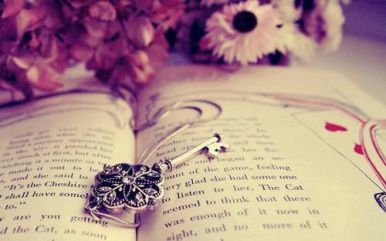
How many times have we all heard that? How many times have we said it (shouted it?) to someone else?
How many times have we followed the directive and been enthralled? How often have we followed the directive, and felt let down?
Recently, I joined the adult book club at my local library. If you’re thinking this doesn’t sound like me, you’d be right. And I joined the local writers’ group (not necessarily published, just writing) as well! What is wrong with this moth?! Well, as much as I don’t seek out socialization, and can only handle small doses of being around other people I hardly know, there are reasons I went head-on into this.
Reason 1: While I love my online writing/reading community, they are not always available to share thoughts, since we all live in different time zones and have varying in-person schedules. However, it meant that I realized I need to branch out in this area. And I do live within walking distance of the library, and the events there are held pretty regularly.
Reason 2: If I never go stray from YA fantasy, eventually I will run out of new books to devour. This is not a good thing for the creative soul. We need to refresh what we take in, not just crazily produce. So, I figured it would be good for me to branch out in this regard as well.
April is National Poetry Month (at least in America), so the librarian had a local poet come in and speak to the book club group.
Poetry and I have a complicated relationship; I understand poetry, but I don’t always like it. Poems that really explore the existential crisis of man are really not my thing. So, of course, this speaker was a writer of the latter. Oh, well. She was a very interesting speaker, with a very interesting style.
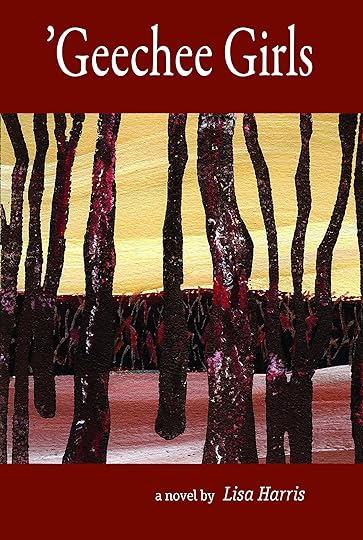
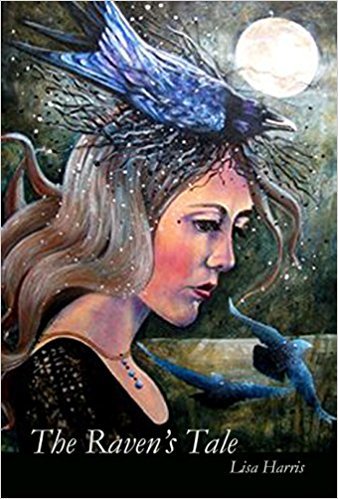
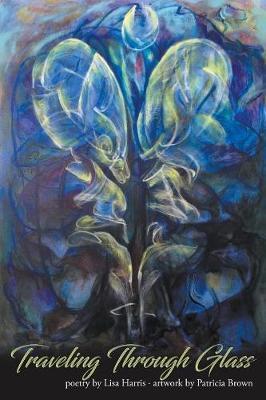
A Tale of Two Book Clubs
Above are her books (I believe they’re all on Amazon); “Traveling Through Glass” is the poetry collection. Lisa Harris has quite a lyrical style, and her plots and characters definitely focus on the existential stuff (which, again, isn’t much for me, but that’s just me). She researches a bunch on fading cultures (for example, the way Native Americans have become a minority) and world religions for her stories.
I have to say, though, that I honestly felt bad for many of the ladies in the book club, because they weren’t really fans of poetry, and some of them were struggling with the topic. I do agree that poetry can be challenging. My favorites are certainly the ones that tell a story, simply in verse (“The Highwayman”), or seem so straightforward on the surface (“Stopping by Woods on a Snowy Evening”) that the reader often doesn’t feel the need to dig deeper. (At least, I didn’t.) So, while I freely admit to sitting in the corner and not contributing to that conversation one iota, at least I was there, present, and taking in something I normally don’t.
Then we all received the selection for the next meeting: “A Piece of the World” (APOTW) by Christina Baker Kline. Never heard of the author, had no clue what the work might be about. Off to a great start on expanding the horizons.
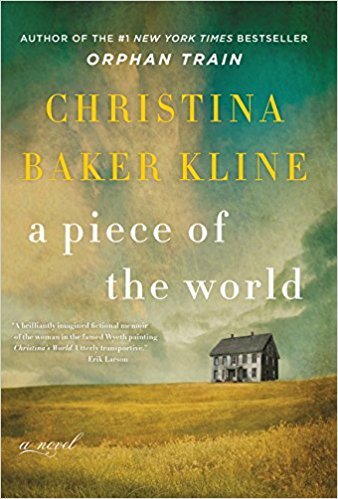
The tricky bit about book clubs is that you might get a real dud. This novel really irritated me. It’s supposed to be basically historical fiction, but I felt the author took waaaaay too many liberties, and I didn’t know enough about the real people in question (the artist Andrew Wyeth and the human subjects he painted) to be sure of how much was inspired by true events, and how much was the author going wild with “poetic license.” And I couldn’t get past that.
If I was writing a historical fiction, I’d set it in a real place and time period, but with completely invented characters. I’d be too afraid of getting it far too wrong. After all, when you’re writing about real people who once walked this Earth, had real feelings and perspectives, family and friends who cared about how they were seen, it feels insensitive to get away too much from the biographical material.
The librarian even admitted APOTW wasn’t her first choice; her first choice got taken by another club, and she suddenly wouldn’t have had something for us to read last month. Luckily, this month that choice was once again available, so it’s our title for the June meeting.
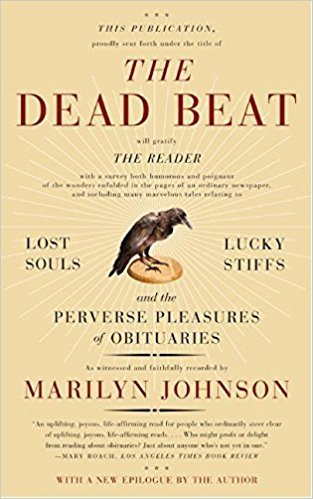
I love the idea of “The Dead Beat” (TDB). It’s not morbid, it’s simply a study of part of our culture. We do write obituaries for people who have just died; humans have done this, in one form or another, for centuries. These days, it’s mostly for the public record, and to let people know this individual is no longer with us. It’s a kindness. But, like so many other aspects of our society, when something has become so functional that it’s plain boring now, somebody wondered how we can spruce it up.
Hence, writing obituaries have become a literary art form. And while this niche does require a certain type of personality, I hardly view this interest as dangerously divergent or an unhealthy obsession. We’re all going to die one day; so, why not make the most of recounting our lives for those still breathing? Why not share our joys, heartaches, our triumphs, and struggles? As dull and mundane as most of us feel our existences are, I can guarantee we’ve all done something others would find amazing.
The Great American Read
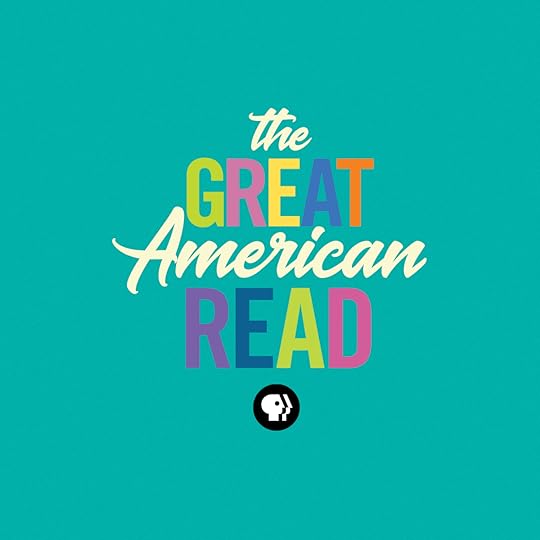
I saw the clip about this on PBS (one of the few channels I still watch). The Great American Read (TGAR) is a list of 100 books, determined by compiling data of consistently referred fiction titles within the last several years. Not just the classics, or the stuff on high school English curriculums. (or example, both Lord of the Rings and The Hitchhiker’s Guide to the Galaxy are on this list.
This summer, our library is encouraging patrons to tackle TGAR and see if they can check off a few of the boxes. Yesterday I downloaded the master list and checked off my own boxes. It turns out I’ve already read 35 of the 100.
Many interesting thoughts get brought up by viewing the entire list. Like, why are there so many British authors on here? (JK Rowling, Charles Dickens, Douglas Adams, JRR Tolkien, CS Lewis, and more.) When the word “American” is in the name of the challenge itself? Maybe it shows that even the natives feel traditional “American” literature is in some way lacking?
Also, just how did they (whoever “they” are) determine what made the list and what didn’t? Is it purely stats of bestsellers? Why are “children’s” works like The Chronicles of Narnia and Harry Potter thrown in with Fifty Shades of Grey and Outlander? (No, I’m not kidding.) Some of the included are definitely controversial — such as Fifty Shades and Outlander, but also Twilight, Game of Thrones, and The Da Vinci Code. I’m not opening the floor to that topic (right now); I’m just pondering the apparent dichotomy.
There are also plenty of titles you’d expect to see — Gone With The Wind, The Call of the Wild, To Kill a Mockingbird, The Adventures of Tom Sawyer. You can find the whole list online; it’s quite a diverse and intriguing selection.
And I am proud to say I’ve read 35 of them. Especially since most of those 35 I enjoyed, and agree with the concept of yelling at the whole country to read them.
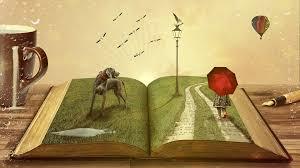
May 14, 2018
Maintaining the Balance: Tackling That TBR Without Losing Your Bookdragon Marbles
[image error]
It really sounds so simple, doesn’t it? Just don’t let your TBR get out of control. After all, reading novels is something we choose to do, and it’s not as if we’re being forced to add every single title we ever hear of to our I-want-to-read-this-one-day list. (Except you are when it comes to my books. Everyone must read my books.)
However, every week, there’s someone on Goodreads or Twitter, in their blog or writing platform, discussing how behind they are on their TBR. And when I think around 40 (what I currently have either on GR or on a scrap of paper somewhere) seems like a lot to buy/borrow and read within the next several months, there comes up a Tweet or a post that informs us all someone just culled 100-1,000 books from their want-to-read shelf.
So, here are some suggestions from this moth, who manages to regularly keep the numbers down. Because life is short, and I like to give advice, and trust me, you all need to take my advice (whether you know it yet or not).
(And, I really need to get a post out, to remind all of you I’m still alive, and this seems as good a topic as any. Brutal honesty wins out today, I guess…)
[image error]
Don’t worry about reading all the books “everybody else” is raving about. Between all the genres I just don’t try anymore and my limited funds, I couldn’t acquire every single title of note from 2018, or 2017, even if I wanted to. So I’ve given up attempting to even recall all of them. I do make note of the impending releases by authors I’ve enjoyed in the past, and titles in YA and fantasy (my favorites) that just sound great. Buuuut…
Don’t hesitate to edit the list. If you come across a bunch of ARC reviews from bloggers whose tastes generally fall right in with yours, saying that a certain hyped selection is really not doing it for them, listen to that, and seriously re-consider purchasing or requesting it. Or if you (as I recently did) get the book in question (maybe you didn’t cancel that pending library hold in time), get a few pages in (I usually give it through the first chapter), and your overall feeling ranges from “meh” to “what the heck?”, have no shame in setting that title aside.
Don’t impulse-order. Whether you may face book-buying remorse when that 10-title order from the internet shows up on your doorstop, or you’re trying to carry 10 hardcovers up the hill from your local library (yup, that’d be me) in snow, sleet and hail, more does not equal better. Focus on the releases you know you can’t live without that season. Like the newest Maggie Stiefvater. Or the latest Volume in The Order of the Twelve Tribes…
[image error]
Know why you’re really choosing to read what you’re reading. Are you picking up a novel you’re actually dreading, but feel that if you pass on it, you’ll be “left out of the loop” on social media? Or can you not wait to open that cover because you just know a rush of emotions and fun and character development are coming your way? Yes, discovering new authors can be awesome. But there’s a lot to be said for sticking with the tried and true. For example, I learned in my youth that I honestly don’t care for murder mysteries, horror, romance, or most of the classics. So, it benefits me now (since it appears a few more days get chopped from my personal calendar every year since I turned 35) to not spend extra hours every month on books I just know aren’t my thing.
Reading is not a competition. Yes, it’s a good idea to encourage yourself to finish a selection in a timely manner. It shows self-discipline and being principled, and I come from a household where we keep saying “one day” and then one day never arrives on certain things. So once I start a book, I like to finish it within a week. (Re-reads are the exception to this rule.) However, don’t compare yourself to other readers. If it takes you a month to complete a really long book or one that gives you trouble because of vocabulary or time period or whatever, so be it.
Set reasonable limits. If you’re on Goodreads (actually, I should say when) and are realizing you can’t even remember why you added a particular title, delete it. If you saw a movie version of a novel and didn’t care much for the story, delete it. If there’s a book on your list that was added in 2015 and you still haven’t gotten around to it… You get the idea. Also, when it comes to “the 100 books everyone should read” and similar things, don’t get sucked into it. Seriously. Life is too short.
[image error]
Take advantage of the library. The library is great because of the free factor, and the no-guilt return if you didn’t like a book. Also, think of the space you saved on your shelves for the future releases you have to have (like all the forthcoming Beaumont and Beasley tales by Kyle Robert Shultz). Plus, investigating a book at the library, with your hands and opening the cover and examining the font size and how many pages there are — maybe even reading the first page — can really help you make up your mind. Sometimes online browsing just doesn’t cut it.
Forget about ARCs. Unless it’s the biggest release of your year, and your soul will shrivel into a useless husk without an advanced copy. Truly, people get fixed on the rush of frantically clicking the button on Netgalley, and then being approved for the latest “next Hunger Games/Harry Potter/Percy Jackson”. And then many times, the hype falls flatter than a skydiving pancake, and bookworms are found sobbing into their carpet until you have to build them a boat and rescue all the animals, two by two. Ain’t worth it, folks.
So, now that you’re all scratching your heads and saying, “Thanks a bunch, Daley, I basically can’t add anything to my TBR by an unfamiliar author, or that I won’t get around to reading within 29 days, or that didn’t come from the library,” relax, grasshoppers. Here’s what I suggest for keeping your list to a reasonable length, and not getting stressed out by attempting to get to the end of it before you’re 98 years old and can’t read small fonts or recall where you left the book…
[image error]
Do invest in reading a lot of reviews — good and bad — about new titles that may interest you. Take a few hours every month and devote it to finding positive and negative reviews of the same book. This could assist in making up your mind faster and possibly without spending money on a selection that you end up not caring for.
Buddy read anticipated releases. This can certainly help narrow down your choices for a particular week or month. It will reduce your TBR and achieve it pretty quickly.
Remember that above all, reading for fun is supposed to be just that — fun. So many of us became book bloggers in the first place because we love the world of story and the written word, and want to share that joy with others of the same vein. Pressuring ourselves to meet requirements that actually aren’t required won’t make us feel good; so let’s do away with them.
[image error]
May 7, 2018
In Which I Explain My Recent Radio Silence
[image error]
Good morning! So, I’m aware that I haven’t been around much lately, and I’ve hinted at reasons why, but here are some more in-depth reasons. And, me being me, I shall beg apologies.
Lately, I’ve been struggling with trying to get together Volume 3 so that it can be ready to publish well before the Realm Makers conference in mid-July. The in-depth reason is two-fold. One: As I was starting to edit, I discovered a massive plot hole about 16% of the way in, and my response was thusly:
“SONOFAFLAMINGBISCUITWHYDOTHESETHINGSALWAYSHAPPENTOMEWHENI’MONADEADLINETHISCAN’TBERIGHTISLAVEDOVERTHISIT’SNOTFAAAAAAIIIIRRRRRR!!!!!!”
Yes, I’m being quite honest. Sadly.
Anyway, after eating some ice cream and watching some Grey’s Anatomy, I got my big-girl pants on and began to tackle Volume 3 — the “final” draft — from the start, as if it were just another rewrite. Which is what it has become. And, guess what? I’m actually enjoying it again.
So, here I am, with a very set deadline breathing down my neck, and I am simply writing as much as I can — creatively, not time-wise — every day. And, thanks to my family and other things needing some of my time, there have been days when I get about 4 paragraphs down before that spark has slipped away for a bit. But all of this is okay. It really is, I’m truly not being snarky. There was a lot of stuff in my notes that I wasn’t going to use until the next book in the series — after already bumping it from Volume 2 — but I’m including it now, and it’s making me pretty excited for readers’ reactions. And that is all good.
Two: I’m feeling my creative spark get worn out rather quickly these days. I need to seriously recharge it with more movies and reading and music (which I often set aside for periods while editing). Last night I chose not to go online, not to read, in favor of watching Thor: Ragnarok, which was an excellent decision.
[image error]
The other in-depth reasons I’m not making bullet-train progress on my impending release are: my health, technology issues, and broadening my horizons.
My health is doing pretty well these days (much better than I was a few months ago), but so far the medication I’m trying for the endometriosis isn’t really working, so I still have to put up with some fatigue and lack of appetite or nausea. It means there are times when I literally don’t have the energy to think comprehensively about my plot or adjectives or phrasing. And there’s not much I can do about that at the moment, except take it with a grain of salt and keep going later.
Until very recently, we were down to one computer in my house, and it was getting ridiculous, since there were 3 of us trying to use it pretty much all the time. So, we got a new, additional computer. Then — the original computer died. And it has not been repaired yet, since the shop we brought it to is, for no apparent reason, dragging its feet and not communicating about what’s taking so long. So, we are, at present, still dealing with up to 3 people attempting to use one computer. I made it clear from the start, when I’m working on getting a new release ready, I need to have first crack at all things PC and internet-related (I regularly forget to look things up during the drafting process, and then remember while editing that I didn’t fact-check a certain reference or the spelling of a last name). But sometimes I get major pushback about this (it seems the words “deadline” and “conference” don’t have the same meaning to people who aren’t me). Anyway, this is another in-depth reason (I’m going to patent that phrase) that this whole editing thing is dragging a bit.
And then there are the additional activities I’m involving myself in at the local library. Is this absolutely necessary? No, and you’d think an indie author, a parent, an autist, already strapped for time wouldn’t consider them twice. However. In taking stock of my sales this winter (another brutally honest moment here), I saw that it would be helpful if I could expand my reach as an author. So I went to the library to look at the monthly calendar and get an idea for what networking was possible (without being annoying). I found there’s a writer’s group that meets every month, and people that belong to it have been asking the librarians questions about self-publishing. So it occurred to me that this might be a good place to show my face on a regular basis. *hides under bed and prays for strength to socialize*
Plus, I’d already let myself get roped into (okay, not really — I didn’t actually fight against it) the adult book club, which is still good because I’ve found I really only read one type of book anymore, and that can be stifling for the creative soul. Going out of my comfort zone to try new genres and styles will probably be very good for me.
[image error]
On top of all this, the end of the school year is approaching, and that means I will have very little time in June for anything other than routine notification-checking and blog-posting. Besides, I need to have Volume 3 finished for a) Realm Makers, duh, b) so I can work more on How To Be A Savage, and c) I promised White Fang we’d start on our joint Super Secret Project this summer. And there’s a writer’s conference much closer to my home that I want to attend the week after RM, so it’d be nice to have more WIP stuff to bring to that as well.
All of these factors combined mean that, although in the past I’ve hated to do it and often felt guilty, I know that I have to disappear for short periods right now. I’m not officially going on hiatus (I’ve tried that before and failed miserably), but I won’t beat myself up if it’s been a whole week since I posted anything new on the blog, or if my tweets are limited to a quip by White Fang every 24 hours. We’ll all have to deal.
No one is bugging me or complaining that I’m not around, and for that, I thank everyone. This writer’s life isn’t always sparkles and fun-shine. It requires serious strapping yourself down to work and quit fooling around on social media or with rearranging your closet more than some of us want to admit.
Anyway, please do continue to visit my archives, and browse my tweets and Goodreads reviews. And I swear I shall soon have bigger news about the results of all my current endeavors.
[image error]
April 30, 2018
Mini-Reviews: The Picture Books Edition!
[image error]
So, last week while I was attending the Thirty Million Words discussion session, it occurred to me that picture books are not something we see a lot of in book blogging. Other age groups and genres are covered up the yingyang, but for whatever reason, picture books aren’t. And since these are the first things most of our children will read, I think reviewing more of these titles and forming a list of recommendations would be helpful (especially for all the parent bloggers out there — she says while wrangling a 3-year-old who can’t accept that eating the last Fig Newton in the bag means they are all gone).
Muffin is enrolled in a program called 1,000 Books Before Kindergarten, and that’s just what it says on the tin: Muffin’s currently up around 600. I worked out that if we read at least 3 new books a week for the next year, we should make it. So I read to him every night. We’ve come across some real gems, and some not so much.
Here’s a smattering of what we’ve accomplished so far this year:
My Little Fox (5 stars)
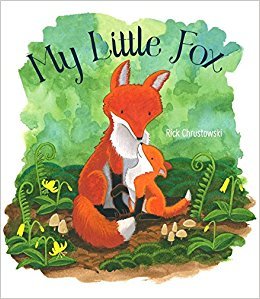
This book gets 10/10 for gorgeous illustrations, a sweet, simple, flowing story, and an absolutely beautiful message about a parent’s love. (It even gets a resounding endorsement from Muffin: “I like that one.”)
I’ve Loved You Since Forever (4 stars)
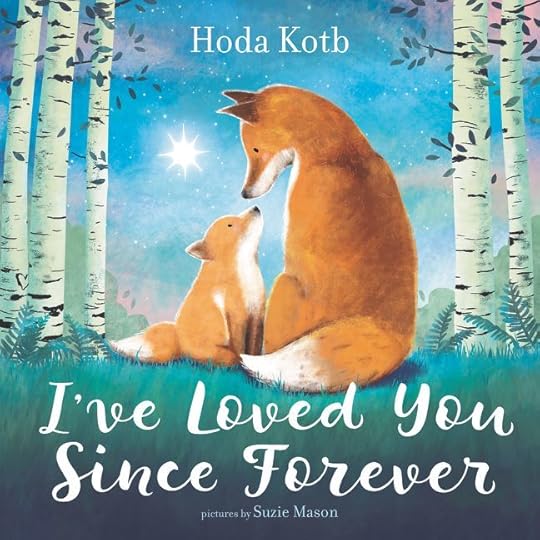
20/10 for the breathtaking artwork in this one. It’s a moving tribute to a long-waited-for child. The lyrical prose may be a tad difficult for younger children to follow (it’s entirely metaphorical).
Mother Earth and Her Children (3.5 stars)
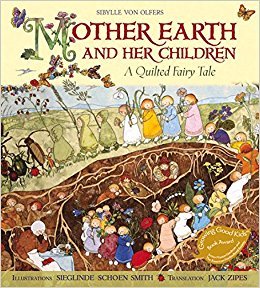
This is subtitled “A Quilted Fairytale” and it surely is. The artwork is portrayed in quilting style, and while I couldn’t tell if real fabric was used for the paintings or photography, the look holds true, and is quite impressive. The prose follows the change of seasons (though I wouldn’t call it a fairytale).
At The Same Moment Around The World (4 stars)
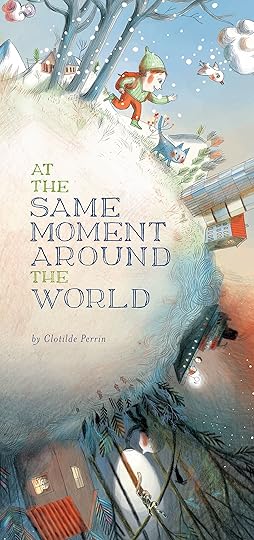
Okay, this is just plain cool. It goes all around the globe, spotlighting an incredible array of countries and cultures and time zones. TOP of the list for introducing kids to diversity in an appropriate and engaging way.
A Surprise for Giraffe and Elephant and Yak and Dove (3 stars)
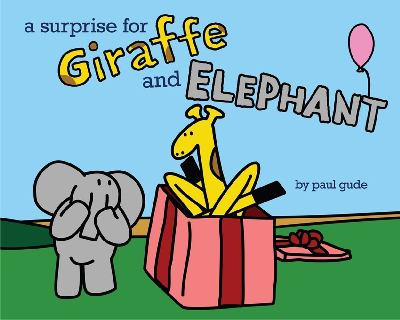
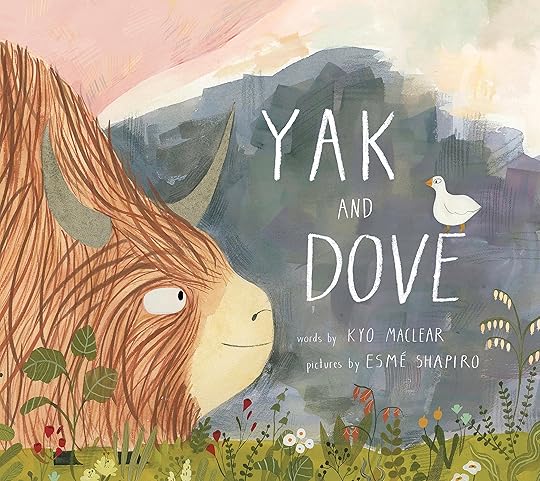
These I’d actually call graphic novels for youngest readers. The storytelling style is similar to comics, even if the art method is nowhere near. There are 3 short tales, all pertaining to the main characters, in each of these titles.
Footprints in the Snow and Big Bad Bubble (2 stars)
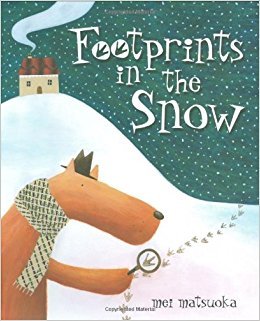
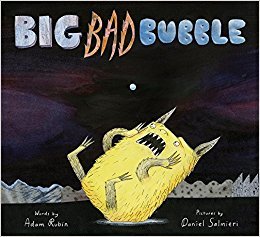
Just because a picture book is a picture book does not mean they’re appropriate for children or quality literature. We tend to think of everything aimed at small humans as fun and cute and wholesome. Unfortunately, this is not the case. Footprints in the Snow gets a low rating from me due to its nonsensical plot. (Even 6-year-olds appreciate something that makes sense). And Big Bad Bubble gets a thumbs-down for its rather dubious method of encouraging kids to dispell their fears. (I’m not sure I can even explain that one. You may just have to read it for yourself.)
On a Magical Do-Nothing Day (1.5 stars)
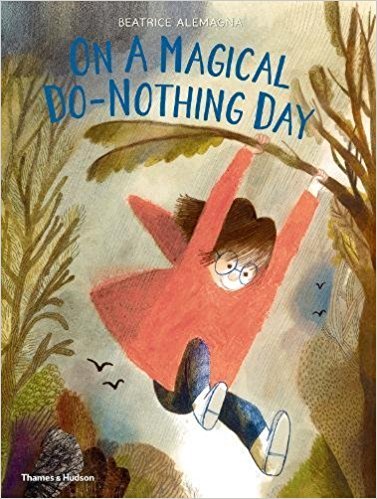
Sorry to end on such a disappointment, but that’s just how the cookie crumbles this time round. This book gets a few points for taking a scenario of having a mom and kid at home while the dad is still at work, and the kid misses her dad and doesn’t really like the fact her mom is working from home, so the kid has to find a way to amuse herself. However, the language used by the child narrator to describe her feelings would NEVER be the thoughts of an actual elementary student. The narrator appears about age 8-10, and the vocabulary and thought structure the writer uses are WAY beyond the cognitive ability of a 9 or 10-year-old, especially regarding emotional processing.
From there, it only gets worse. The kid wanders off, alone, in the woods — isn’t that just dangerous? Where the hell was the mother for that part? And the kid drops her handheld gaming device into a pond… And therefore has to find a non-evil-electronics way of staying occupied. This one-sided-moral-lesson-as-plot-device move made my blood boil. Oh, yeah, a young kid can stroll off into the deep, dark woods, in the rain, all by herself — buy GOD FORBID she play video games! And while, yes, there are other things to do in life, and being outside is valuable, too, the way the author presented that view was simply deplorable. It was particularly shocking to see that 1960s perspective in a book that was published in 2017!
And there we have it for this time! See you on the flipside, moths!
April 24, 2018
Thirty Million Words
[image error]
So, a few months ago, I was asked to participate in a library discussion group concentrating on the non-fiction title, “Thirty Million Words,” which is a combination research-report/hopes for the future book covering a long-term study conducted by Dana Suskind, MD, who was an audiologist and a surgeon of cochlear implants (those devices that are inserted directly into deaf ears to produce hearing). Anyway, what all of that long-winded introductory sentence means is this — The librarian knows that I have special needs kids (including speech difficulties), and thought that I’d be interested in the topic of how language builds the brains of children.
And, yes, I was, and am. Since I finished my degree in Early Childhood Education, I’ve been very aware of and into this sort of research. Granted, now that I’m out of the preschool classroom, I don’t keep up on these studies as much as I would like to. Reading this book was a very good way to get back into it.
“Thirty Million Words” is about so much more than how language development affects a child’s future academic and social performance. It’s about critically examining the gap between economic classes when it comes to educational achievement, the vast differences between the self-esteem and personal success of children who were “talked to” enough (as opposed to those who apparently weren’t), what that actually means, how ideally every child would obtain it, and what this research means for our society as a whole.
It’s fascinating. Terrifying. Amazing. Inspiring. Intimidating. I’ve never read a non-fiction book on this topic with this amount of weight before. Most of my textbooks for ECE were either the history of education (with very little about how to potentially grow and advance it for the 21st century), or psychological studies about child development, which is all well and good, but goes only so far when you’re trying to get into the mind and the heart. Suskind didn’t simply repeat what we’ve been hearing on the news for 30 years — that children from economically disadvantaged backgrounds will most likely struggle more in academics — she looked at possible ways to change that.
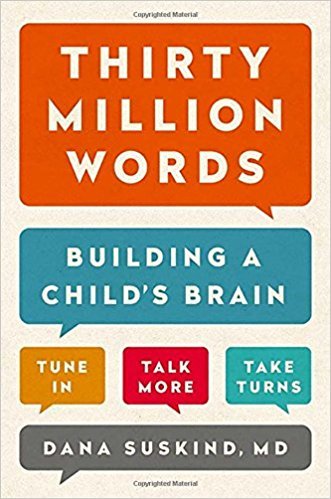
The early chapters are heavy on the “technical” stuff — jargon, other studies in this field, Suskind’s own background in audiology and how some of her patients’ results influenced her to learn more about language and the growing brain. In the middle of the book, she begins to really discuss the problems our current culture is facing as a result of being deficient in a particular type of linguistics — families engaging in routine conversation just for the sake of bonding. And this is where the immediate consequences of this decline in America truly starts to hit home.
As I read, I realized that she was saying something quite contradictory to what the modern era has been striving towards: Technology is not going to help our society evolve, it’s going to make it crash and burn. What she found was that more and more parents are tuned in more to their screens, especially handheld devices, in their children’s presence, and are relying on “educational TV” or “learning apps” to teach their kids things we’ve been teaching via human interaction for millienia.
In the 20th century, we used technological advances to enhance our communication; the telephone could relay important information that before would’ve taken days or even weeks to reach someone via letter. Television was to become informed and entertained; we watched the news, and learned things about our world that we’d never imagined; classic books from all genres were made into movies, accessible to tons of people of all ages for the first time, sharing archetypal stories that had already been passed down over generations.
Nowadays, we are using our technology to hide from other humans. Evidently, even our own children.
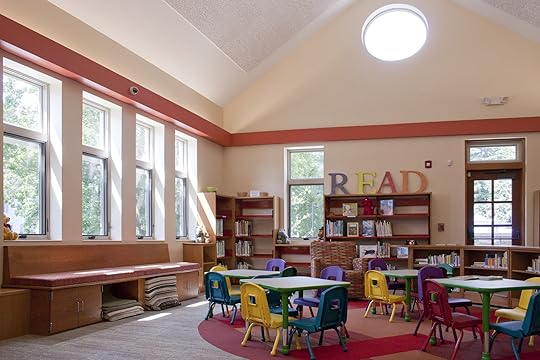
(This is the children’s area at my local library, by the way.)
Suskind discovered that children who were raised in homes where screen time (for both adults and youth) was limited, and physical interaction encouraged — beyond “eat your dinner,” “brush your teeth,” “good night” — regardless of whether their family earned 100,000 dollars a year or 15,000, made significant advancements in academics, personal success, and were likely to consider themselves capable, confident individuals.
Yes, it goes that far. It just isn’t talking to — not at — our kids. It’s what we say and how we say it.
Before I had Muffin, I made a habit of trying to read and watch faith-based self-help. Not the cheesy type that makes us all groan and roll our eyes, because the pastors in question are wearing expensive clothes and have gigantic smiles with perfect teeth, and their idea of “suffering” is their dog refusing to hold still for grooming. No, I greatly preferred the practical, will-actually-make-an-impact, Biblical-principled. Joyce Meyer and Max Lucado are still my favorites. And they have both been quoted as saying: Words have power.
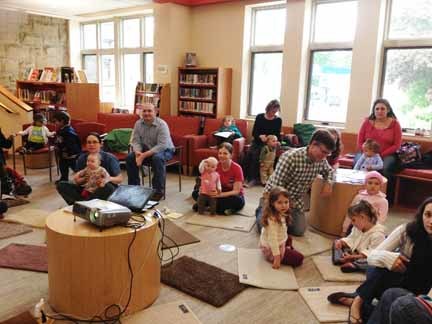
Meyer and Lucado got it absolutely right: No matter what “the world” may tell us (“shrug it off,” “don’t take it to heart,” “they don’t really mean it”) — words can hurt. Or words can build us up, increase our joy, our determination, our feelings of worth and purpose. It’s been in the Bible for thousands of years. How many passages are dedicated to showing us how God feels about His creation by verbal explanation?: love, mercy, grace, forgiveness, peace, wise, comfort, Father. I am the Life, Living Water. Come to me, lay down your burdens. The 23rd Pslam is one of the most well-known Bible passages in the world because of its incredibly beautiful and affirming word imagery.
Now science is reinforcing that.
And even as an autist, I can attest to the value of face-to-face human interaction.
I love reading to my kids. Well, these days it’s just Muffin. White Fang gave up being read to pretty much as soon as he was able to silently read himself. And I do strive to have meaningful conversations with my boys — beyond instructions and a blase` “how was your day?” Yes, even Muffin and I can have meaningful conversations. (Anyone who dares to claim there is no such thing with a preschooler, I’ll meet you out back with my nunchucks.)
My goal in all of this is not simply to make sure they’re doing well in school. It’s not even because I love them and want to know they’re happy. Well, yes, of course that, duh. But my ultimate endeavor in carrying on continual discourse with my children is to help them become more. To ensure that they develop a strong sense of self-worth, that they know I — the authority figure, the unreachable “old person” who might “not understand” — do value what’s important to them.
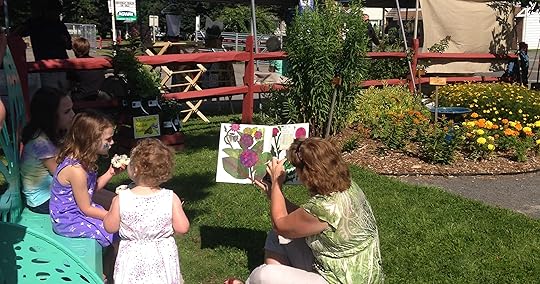
By doing so, I am helping to make these fledging little humans into whole people.
This really is how we’ll evolve as a society. As individuals, as a culture.
Everybody who works with kids needs to read this book. Not just teachers, but social workers, school administration, bus drivers, janitors, recess monitors. Pediatric nurses and speech therapists and day care staff. Not just parents — grandparents, aunts, uncles, adult cousins, babysitters. Librarians, library volunteers. The folks who give kids swim and art and music lessons, run sports teams and Boy Scouts and Girl Scouts.
Just, everybody.
So we can start to make the future our children deserve.
[image error]
April 23, 2018
Reviews Are Still Important
[image error]
Here’s a sad little suggestion going around the internet: Book blogging isn’t necessary anymore. Yes, a lot of book bloggers are getting burned out, because it’s time consuming, and not always rewarding, and can feel repetitive. Well, on World Book Day, here’s why I think taking the time and effort to create our reviews and put them on our blogs is still important.
We can present an unbiased account of a title to a weary, cash-strapped public in desperate need of something good to read. Okay, maybe I’m getting a little dramatic here. But heaven knows that I’m a lot more satisfied with my library selections since subscribing to book blogs and Goodreads. As a busy mom/work-from-home writer, I can totally affirm for the majority of book-lovers that our spare time and spare money is limited. So we’d really appreciate a heads-up if we’re about to drop precious coin and hours on a novel that will make us want to run away to Albania and become a goat-herder in despair.
Since we aren’t being paid for our opinions, we have no reason to sugarcoat what we didn’t like about a book, or encourage people to buy it if we honestly feel they’re better off choosing a different release.
[image error]
We’re helping to keep alive the art of literary analysis. Yes, I’m completely serious. Less and less in college and even high school are English classes teaching how to accurately analyze a piece of literature. More and more on Goodreads, I’m seeing low ratings posted by younger (teen) readers for literary-complex books, and their reason is simply: “I didn’t get it.” No, most people won’t go on to break down symbolism and allegory and archetype for a living. But it is a VITAL skill to possess. It encompasses problem solving, objective debate, understanding motivation, and learning from past failures.
We’re giving critical feedback to authors — especially indie authors. Indie authors are quite often people without creative writing degrees who are self-publishing purely for their love of the written word. A lot of us can benefit from receiving detailed reviews that point out what readers loved and what they thought could stand to improve. We don’t have big publishing companies throwing a ton of advertising at our work, so this can definitely make a difference in sales, as we can get a concrete idea of what our target audience is after.
[image error]
So, what makes or breaks a review? Not whether you give the book a positive or negative review. It’s the WHYS.
You need to be specific. You don’t have to go through the selection chapter by chapter (in fact, many people would rather you not do that), but you must explain why you did or didn’t like something.
A lot of it does come down to personal taste. Certain content and genre preference should not be considered gold standards for “good” or “bad.” It’s absolutely valid for “like” or “dislike.” But, please, please know the difference.
[image error]
Here’s what I look for when I read a review:
Adjectives. PLEASE stop just typing in, “This is soooo good!!!” and logging off. This tells me NOTHING. If you say, “This novel had a lot of clean humor that had me laughing out loud, flawed but relateable characters that I was cheering for, and an action-packed plot with a jawdropping resolution,” then I have a much better idea of what you think. And, by the way, I’m aware how “writer-y” the above example sounds. But I feel it’s important to develop a real craft to how you opine. Even if you never intend to have a career as an author/journalist/librarian, there’s an impactful difference between: “This book was stupid” and “The main character made a choice that put others in danger, and I thought that was a bad move.”
More than a rehashing of the blurb on the cover. I can find the synopsis of the plot aaaaanywhere. That doesn’t give me any insider information. Which is what I’m after as I peruse blogs and social media.
[image error]
I avoid haters. If you really, loathed the content, the style, the story, or everything of a book, this is actually fine. This is free speech in action. I’ve left a few scathing reviews myself, when I truly felt it was warranted. However, you’ll never catch me sending hate email or tweets to the author, or the reviewer, and I won’t track with those who do.
You must have read the book for yourself. Recently I learned that some people are leaving 1-star/5-star ratings for titles they’ve never laid eyes on simply because their friend/relative/minister/favorite celebrity claimed it was racist/prejudiced/inappropriate. No. …No.
The same goes for folks who think that any fiction tackling tough topics (racism, war, suicide, domestic violence, child abuse, self-harm, addictions) is “bad” simply for discussing the hard stuff. NOPE. Not a valid reason to slam a publication.
[image error]
A final few words: Are all our reviews going to be totally awesome little articles of genius? Yeesh, no. I’m sure some of mine aren’t detailed enough, or may have used too much slang for a broader audience. Is this okay, too? Yeah. If I had a tough time getting my thoughts to coalesce on this or that book, well, I’m only human. And I can always go back to my Goodreads account and revise later.
Do remember that people are getting something out of your reviews. Keep it up.
[image error]
April 22, 2018
The Non-Fiction Future Additions to How To Be A Savage
[image error]
Recently, I did a couple of things. I asked Twitter if anyone would be interested in reading an inspired-by-real-life-but-definitely-not-autobiographical account on autism in blogging format or something. And then I asked whether it should be fiction or non-fiction. Like, facts about ASD and various treatments and such.
The polls indicated people would be extremely into reading a combination of both.
And I thought, “Oh, okay. That’s…err… Why did I set myself up for this??”
Then today, I stumbled on an autism blog share, and as I was reading some of these posts, I realized: There isn’t just a public interest in us sharing our life stories. There’s a need.
It’s only been about 50 years since most children with low-functioning autism were officially diagnosed as minorly psychopathic, and generally locked up in institutions.
It’s only been 10 years since diseases like measles and rubella that were nearly eradicated have made a solid re-entry into the Western world, thanks to an epidemic of people not vaccinating their kids, based on one, non-scientific study claiming that the MMR vaccination causes autism.
It’s only been a few months since I saw a book in which the mother of an autistic teenager supported forced sterilization of her son has a 4-star rating on Amazon and Goodreads.
[image error]
And it was only today that I read an article from the New York Times reminding all of us — or informing us for the first time — that Dr. Asperger was in fact a Nazi who sanctioned the deaths in concentration camps of the very children he diagnosed. And we still put his name on the part of the spectrum he supposedly discovered.
Dear God in Heaven.
Adopting a cavalier attitude towards my privacy, I have henceforth decided thusly: When I come to compose my various Wattpad-age entries of How To Be A Savage into book format, I SHALL include factual stuff about diagnosis, treatment, the NTs-who-hate-us experiences, the dark side of our condition, all of it.
This feels daring. It feels scary. It feels like the right thing to do.
[image error]
For the longest time, we have been led to believe that anything outside of the norm is dangerous. Even when it isn’t. Even when it’s simply different.
We don’t need to be encouraged to fit into the world. The world’s pretty messed up, in case no one’s noticed. I’d so much rather stand out — and hopefully makes this crazy planet a better place.
I am so tired of being told we need to “overcome” our autism. Of hearing that we have a “disability.” Of being looked down on.
Who’s with me?
[image error]
April 21, 2018
Spotlighting Masters and Beginners!
[image error]
One year ago today, I officially put my baby debut on sale, thrust the result of my hard work and long wait to be published into the world, for public consumption. Wow, that makes it sound not quite as pleasant as it actually was. Well, I have to admit, seeing Masters and Beginners on Goodreads, seeing the ARC reviews on blogs, was almost terrifying at first. In a good way.
Anyway, since this is my “bookiversary” (yes, anniversary of the book’s release), I wanted to mark the occasion with the fanfare it deserves! Seen above is the redesigned cover of the first installment in my fantasy series, The Order of the Twelve Tribes, created by Kyle Robert Shultz. The story inside either the first or second edition cover is the same; I switched printing companies, and wanted to do certain things announcing my establishment as an author — like secure a cover designer for the whole series, really increase my presence on Goodreads and Twitter, and build a solid foundation of loyal fans who would move mountains for me. Okay, I’m being slightly facetious on that last bit. But the fandom part is important. To those of you who have been around since the beginning, I want to say (again, but it never gets old) THANK YOU, for all your support and participation and faith in my writing.
So, today I want to go a little nuts, waxing lyrical on my own title, and we’ll celebrate Masters and Beginners: Volume 1 of The Order of the Twelve Tribes!
[image error]
The story focuses on the Driscolls, a pretty ordinary family that lives in a pretty ordinary town in Ohio. The reason we choose to follow their tale is because they’re actually descended from a secret organization called The Order of the Twelve Tribes, which knows the forgotten truth of the universe — that faeries, angels, and monsters are real — and the Order protects unsuspecting people from the more unsavory of these creatures.
Sophie Driscoll and her brothers, Flynn and Cal, and their parents, James and Kate, take over running the Annex, a local facility that stores documents and objects related to Order history and the fey. As they officially join the Order, they find themselves immersed in a world of literal magic, and danger.
As if that wasn’t enough to whet your appetite, the new neighbors are demi-fey (half human, half faery), their pets are talking, shapeshifting cats, and I leave Volume 1 off on a twist worthy of the most brilliant/evil author. It ensures that you’ll have to read Volume 2 (see, brilliant) to find out what happens.
[image error]
Classified as YA (because I wanted to write something my kids could read before they were all grown up), my contemporary-fantasy-blend series isn’t limited to the ages of 12 to 17. Scattered throughout the text are references to the art and entertainment that helped bring about my inspiration to write this tale, such as Harry Potter, Discworld, Warriors, Warehouse 13 and Doctor Who. My playlist during the writing part of this project also receives its credit, by appearing in the form of lyric snippets at the start of each chapter.
[image error]
There are still a few copies of the first edition available, which can be acquired through me (though I only accept cash, check, or gift card, sorry). The redesigned cover/second edition can always be found at Barnes & Noble: https://www.barnesandnoble.com/w/masters-and-beginners-daley-downing/1126998956. (And they accept credit cards, and often have free shipping deals.)
If you enjoyed Volume 1 and feel inclined to post a review on Goodreads, Barnes & Noble.com, or a blog, that’s fantastic, and I espouse further thank yous still.
This last year has been quite the journey, and I look forward to what comes next! See you all there, moths!
[image error]
April 18, 2018
Looking Ahead: Plans for the New Season
[image error]
Is it time to send out a search party for spring?
If you said yes, I wholeheartedly agree.
However, given that the calendar says mid-April, and April is, mathematically, a quarter of the way through a solar year, I believe this is a good moment to evaluate plans for 2018.
Is it just me, or is there this sense of a rut? Of wanting 2018 to be amazing, but getting more caught up in the “I wish I could…” instead of just going forth and doing. I’ve seen a lot of that on social media lately. People say, “I really want to get X, Y, and Z accomplished by a-b-and-c.”
Last year, I felt that way a LOT. And I swore that this year would be different. Well, guess what? Here we are, in April, and I already know most of what I’d hoped to do I won’t be able to.
So, rather than becoming bogged down by this rushing current of “other people moving ahead,” I’ve decided today to focus on how I can move myself forward.
[image error]
No more taking on unanticipated projects. I’ve already committed to finishing drafts of Volume 4 and the Super Secret Project by summer’s end. There are at least 2 other books I want to write in the Twelve Tribes world. Recently, I established How To Be A Savage on Wattpad. So, I have enough on my plate at present. I was originally going to put new snippets of HTBAS on the blog first, then upload extended chapters to Wattpad every week. Guess who hasn’t done either yet this week? Yupper, me.
So, I shall simply be posting Savage on Wattpad. (By the way, if you are a Wattpad-er, please look it up! https://www.wattpad.com/554416578-how...)
Let’s test the boundaries of my comfort zone. Not in any way that will actually be damaging, of course. Yesterday I went to an event at the local library — second week in a row! — and was around all these other people…and inside I was totally wigging out. Last night I felt like I’d reached my extroverting limit for the next, oh, approximately 374 years. But now that I’m a published author, which is something I’ve been working towards for quite a while, it’d be really helpful if I was able to make public appearances.
So, yesterday, although I had not intended to do this, I found myself signing up for a book club before I left the library. I even started reading the selected title last night. And next month, I may very well go to this meeting and sit in the back and not speak to anybody. But, hey, it would be progress. Because when you can only handle 4 or 5 people showing up to a group that you agreed to speak to about self-publishing, and they all say they’d like to have you come back at some point and speak to bigger groups, and this idea sends you into emotional spasms… That’s not healthy. I will probably never be able to address an auditorium of 300 people. And that’s okay. But why not 10, or even 25? Surely I increase my chance for more sales if I reach more potential readers…
[image error]
I can’t be at Realm Makers this year, and there is no reason for guilt. I crunched the numbers, and between the conference cost itself, the flight, the hotel, and the emotional toll traveling by myself to St. Louis in July (which equals much heat, and I and much heat do not get along), it was not pretty. At least I get to be present in some respect by sending my books to the conference. And, honestly, I’m not the greatest at staying in hotels (around strangers, out of my usual routine and surroundings), so this is a wise decision. Hopefully next year RM will be held in a Northeast city (where July temperatures rarely get above 85 degrees), and not being so far from my family would ease the tension.
Stop stressing about my health. For the most part, my health is under control. But it looks like I’ll be on medication pretty much forever. This is something I’ve never had to deal with. I’m not losing sleep over these issues anymore, but I’d be lying if I claimed it wasn’t on my mind at all. There are too many other things worth concentrating on more than the what-ifs.
[image error]
Let’s skip the hashtag games and tag posts. For any of you who have ever tagged me on Twitter or the blogisphere, thank you for thinking of me. I do mean that. Though trying to keep up with all of it really eats into the time I allot for writing. So I’m not going to pressure myself.
I need to stick to what I keep telling myself about television. Why am I wasting my time seeing if shows I know are going downhill may possibly have been slightly better this week? With season finales coming up for everything, this’d be a great point to cut the cord, so to speak. Rather than taking my attention away from important stuff, like writing and editing, or reading. And I could avoid the frustration I know is coming. Yes, yes, and yes. White Fang and I can focus on catching up on The Walking Dead and our movie queue on Netflix. Sounds brilliant.
[image error]
And stick to what I’ve been saying about my TBR. No. New. Library. Books. Not until I have finished the books White Fang already owns that he’s been bugging me to read. And then I can start tackling the indie books that have been multiplying like plot bunnies on my list of “one day, one day.” Yes, finances honestly do play a part in this endeavor. However, if I start purchasing, say, one book a month, then pretty soon I will have most of the titles I’ve been eyeing for a while. And realistically, it will take me a while longer to finish reading them all, so I’ll never be without something new to read… So, what’s the downside here?
What about you, moths? How are your yearly goals coming along? Any need to revise??
[image error]
Daley Downing's Blog
- Daley Downing's profile
- 36 followers



